Etymology 101
We all know that words have meaning, but have you ever stopped to think about where those meanings come from? Etymologies, or the study of word origins, can provide valuable insights into the history and development of a language.
The etymology of a city's name can often tell us a lot about its history. In many cases, the name of a capital city will reflect the dominant culture or religions of the area. For example, the name "Rome" is thought to come from a legend about the founding of the city by Romulus, the son of the god Mars. Similarly, the name "London" is believed to derive from the Celtic word for "river," reflecting its position on the River Thames.
Here, we’ll dive into the capital cities of some of the most prominent countries across the globe, and how their names came to be.
Your Etymology Guide
- To make it easy to consume, we’ve broken up the article continent-wise. Toggle between continents and enlighten your mind depending on which country/city you’re curious about.
- Each continent has an infographic with a short explanation of how the name of the particular city came to be. Use this as a springboard to dive deeper into the cities that intrigue you the most.
- In addition to the etymology of the capital cities, there are interesting facts about the origins of some well-known and obscure cities spread across the article. Keep an eye out for them!
Africa
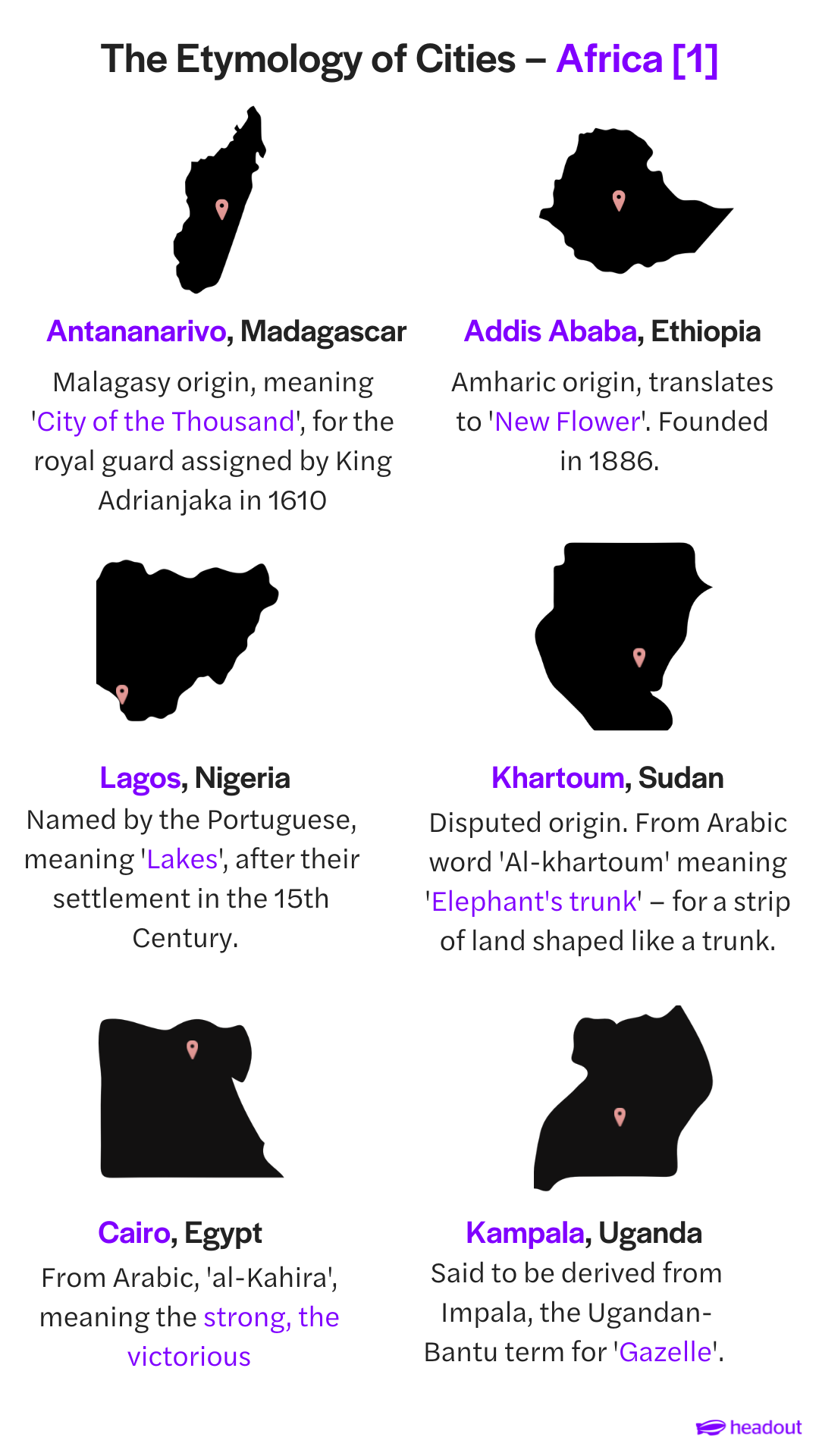
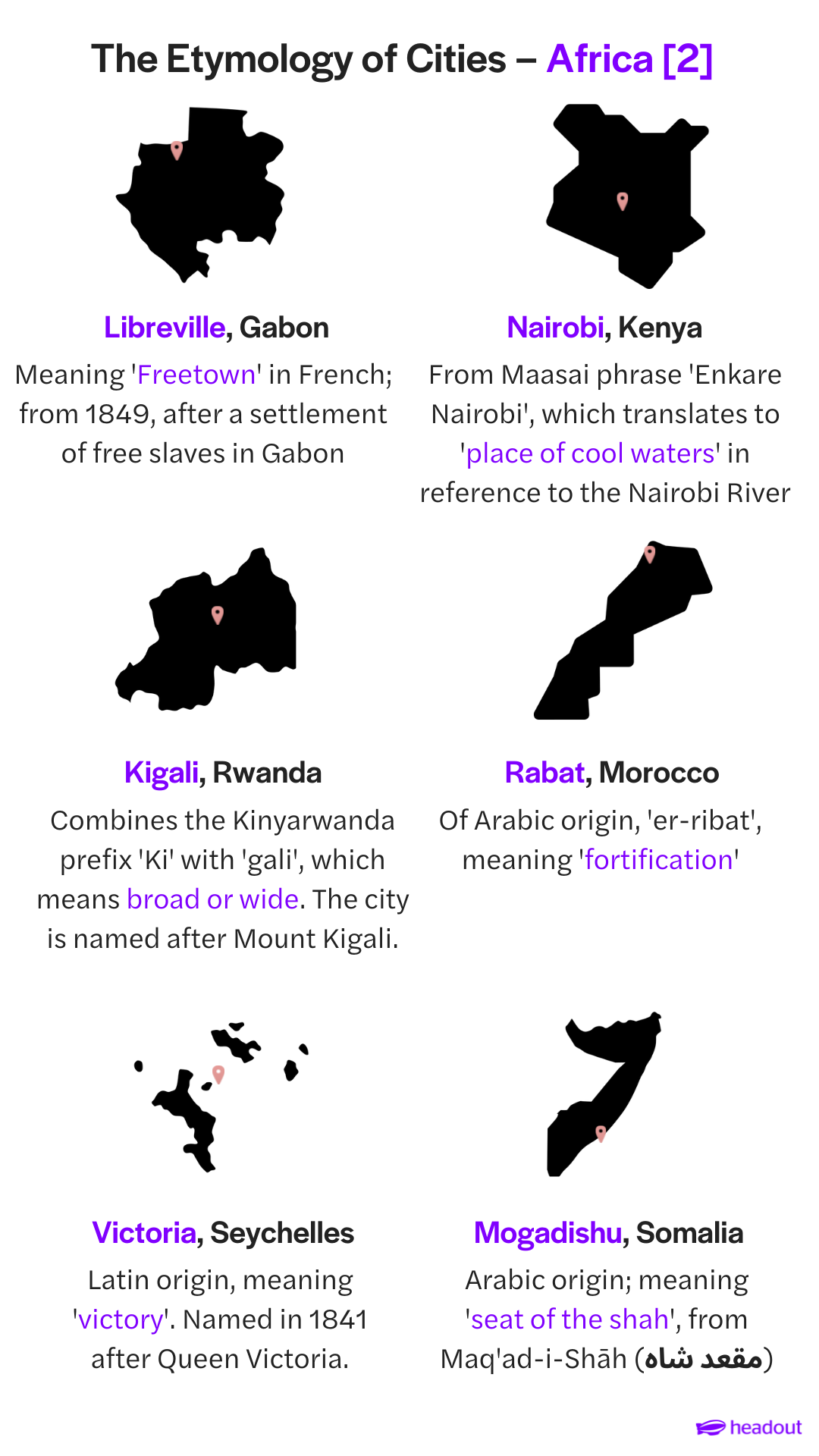
Did you know?
- Burkina Faso's capital Ouagadougou goes back to the 15th century. After constant conflict between the Yonyonse and the Ninsi tribes, Wubri, a Yonyonse hero led his tribe to victory and renamed the area to "Wogodogo", meaning "where people get honor and respect." Ouagadougou is a corruption of Wogodogo.
- According to a legend, the name of the capital city of Guinea, Conarky, comes from the fusion of the name "Cona", a wine and cheese producer of the Baga people, and the word "nakiri", which means in Sosso the other bank or side.
- In 1865, Sultan Majid bin Said of Zanzibar began building a city near Mzizima, and named it Dar es Salaam or "harbor/haven of peace" with Dar in Arabic meaning house, and es salaam meaning peace.
- Portuguese explorer Paulo Dias de Novais founded Luanda under the name of “São Paulo da Assumpção de Loanda”. Novais named Luanda after his settlement, spelling it first “Loanda“, then “Luanda“.
- "Windhoek" comes from the Afrikaans words for "wide corner", a reference to the city's position at a wide bend in the Khomas Highland plains.
- "Johannesburg" comes from the Afrikaans version of the Dutch name for founder Pieterpretorius.
Asia

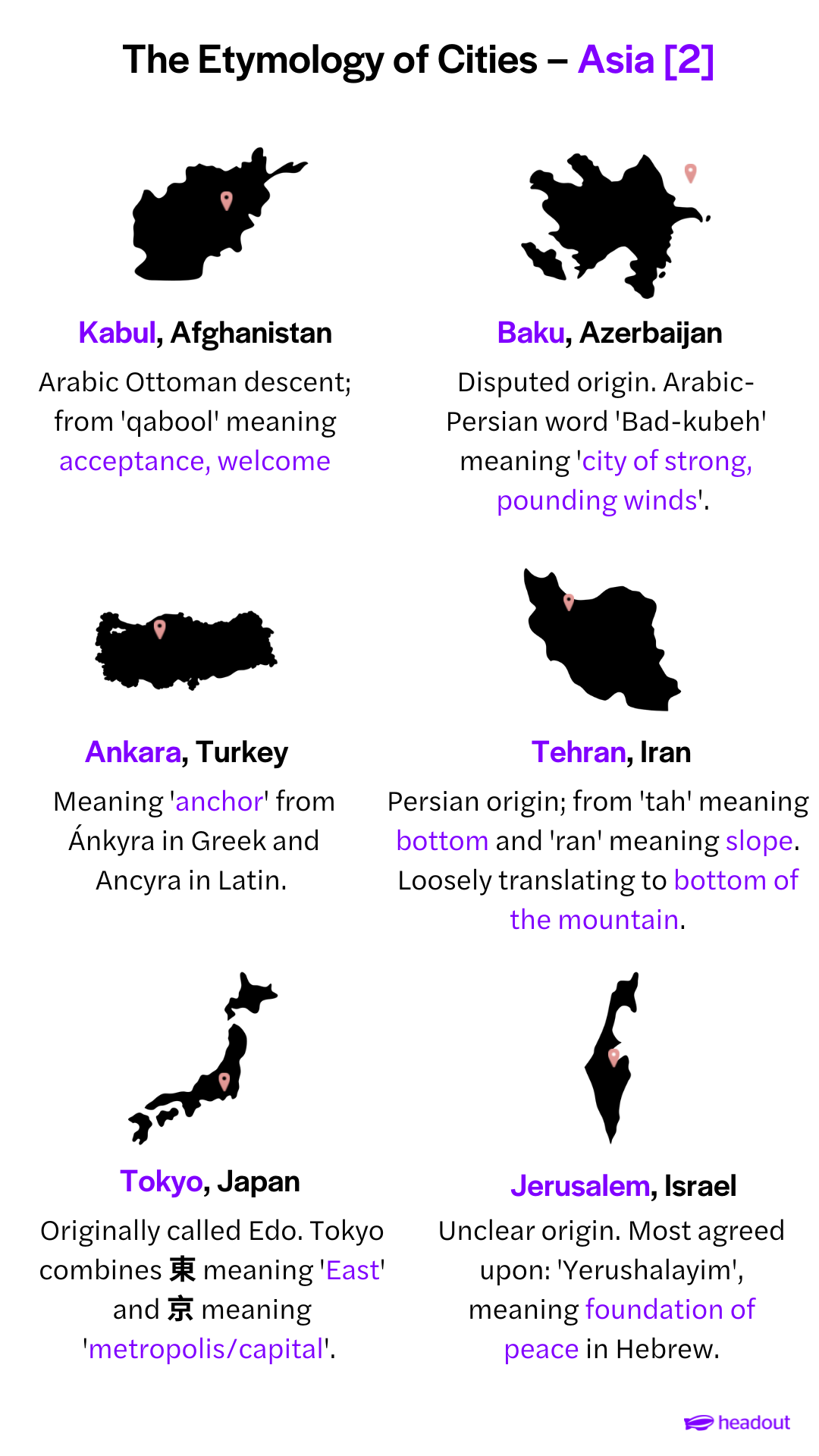
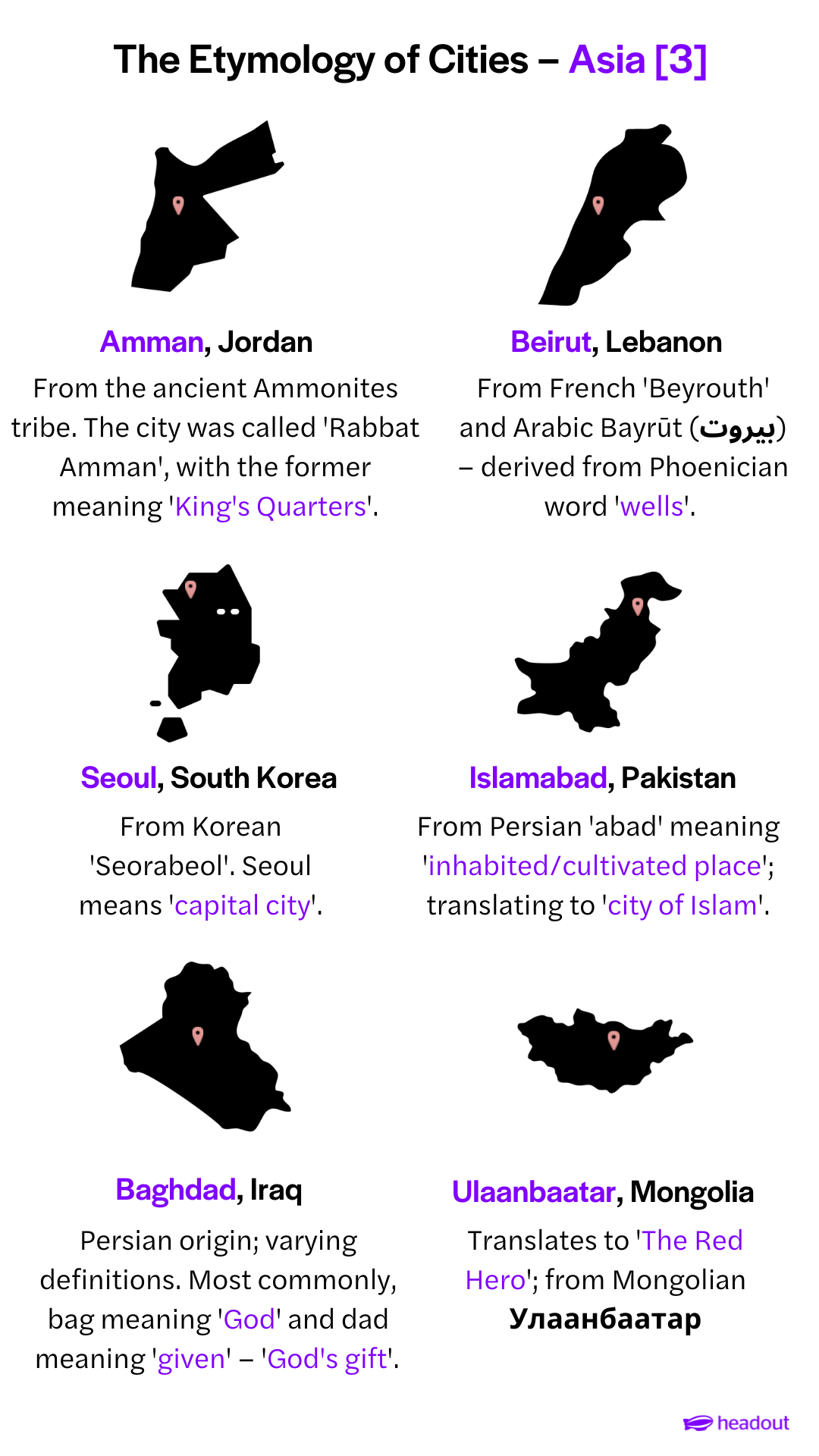
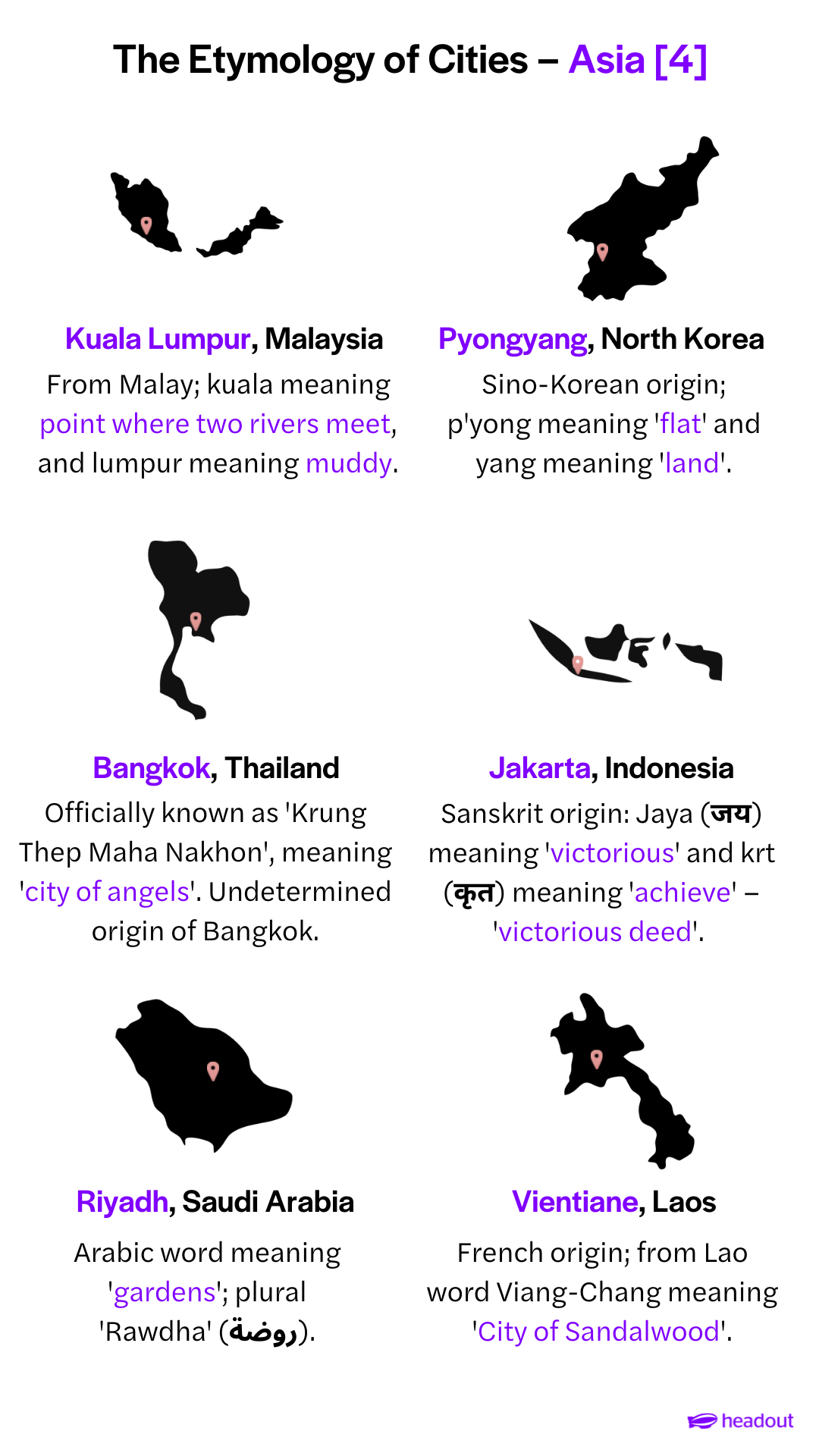
Did you know?
- Chechnya’s capital is called Grozny, which translates from Russian as “fearsome”. It goes back to the name of the colonial fort that the Tsar established in Chechnya at the start of the 19th century.
- A city sometimes reflects the act of will of the individual who brought it into being. Alexander the Great named Alexandria for himself, while Peter the Great gave St Petersburg the name of his patron saint.
- The capital of Uzbekistan, Tashkent, probably dates from the 2nd or the 1st century BCE and was variously known as Dzhadzh, Chachkent, Shashkent, and Binkent; the name Tashkent, which means “Stone Village” in Uzbek, was first mentioned in the 11th century.
- "Beijing" means "Northern Capital", a reflection of its status as the seat of government for the northern part of China. Similarly, the name "Tokyo" means "Eastern Capital", a reference to its position as the primary city in Japan.
Europe

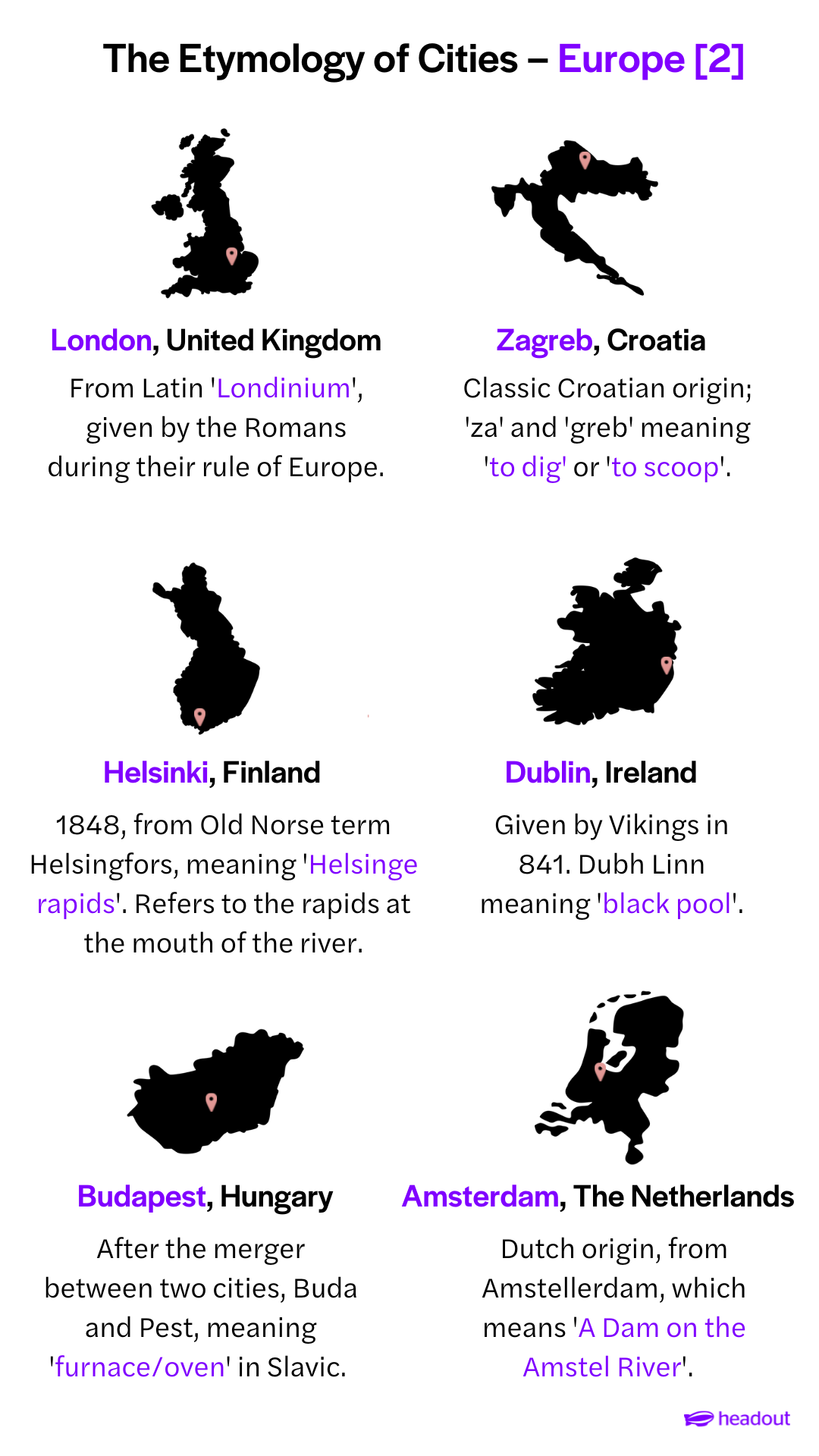


Did you know?
- Istanbul, once called Constantinople and before that Byzantium, has been the capital city of three different empires. It is shaped by the surviving fragments of the Greek, Roman, Byzantine and Ottoman civilisations that built it.
- Amsterdam, Minsk and Moscow are all capital cities whose names are derived from rivers.
- Vatican City, Monaco, Luxembourg and Andorra are a few examples of countries and capital cities sharing the same name.
- The name "Paris" is derived from a Celtic tribe that settled in the area during the late Iron Age. However, it was not until the 5th century that Paris became the capital of France.
The Americas


Did you know?
- Ottawa was founded as Bytown in 1826. In 1855, it was incorporated as Ottawa, from Ottawa River, whose name was derived from “Odawa” which means “to trade”.
- Tegucigalpa, the capital city of Honduras is a curious case with the exact meaning yet to be determined. The most widespread theory is that it comes from the Nahuatl Teguz-Galp, which means "silver hills", but it is difficult to sustain as the natives were ignorant of the existence of minerals in the area.
- Managua, the capital of The Republic of Nicaragua, is derived from from Mana-ahuac, which in the indigenous Nahuatl language translates to "adjacent to the water" or site "surrounded by water".
- The capital of Brazil, Brasilia, comes from the Portuguese word for "brazilwood", a type of tree that was once found in abundance in the region.
- Buenos Aires, means "good airs" in Spanish. This was chosen due to the city's location on the banks of the Rio de la Plata, which helps to keep the air fresh and clean.
Oceania
A quick look into the Etymology of some Australian cities
- Canberra is the capital of Australia. Several other names were suggested when the name was up for debate: Paradise, Captain Cook, Sydmeladperho, Eucalypta, and Olympus, among others. Canberra is thought to be derived from the native Walgalu word 'kambera', which is believed to mean “meeting place.
- Australia’s current largest city is named after Lord Sydney, the Secretary of State for the Home Office. Lord Sydney was the man in charge of deciding where to send the convicts from England and he decided upon Botany Bay.
- When the First Fleet arrived in 1788, they discovered that Botany Bay wasn’t suitable, so they explored a bit further up and found fresh water and a cove which was later named Sydney Cove after the lord. The city that was eventually built up around the cove was called Sydney by association with the cove.
- Starting in the 1850s, the people living in Queensland—then part of the New South Wales colony—started petitioning for independence. The seat of the colony, Sydney, was too far away, and future Queenslanders wanted to govern themselves.
- They petitioned to separate, and in 1859 Queen Victoria granted them their own colony. They named it Queensland to honour her, as the colony of Victoria had already been established.
- Not only is the state of Victoria named after the queen, but Queen Victoria was able to name the capital city as well. She named it after William Lamb, the 2nd Viscount Melbourne, who was a close friend and adviser to Queen Victoria.
Our hope is that you have either been able to satisfy your curiosity and/or spark it further by coming across something you hadn't seen before! Use this as a foundation to embark upon your quest to uncover more about the history of some famous (and forgotten) cities. Who's to say what you might find?

